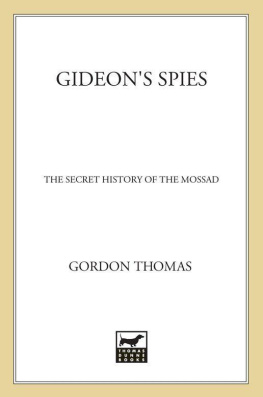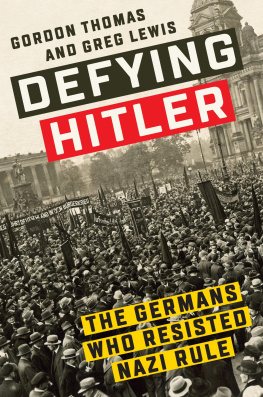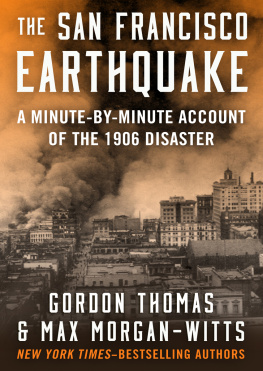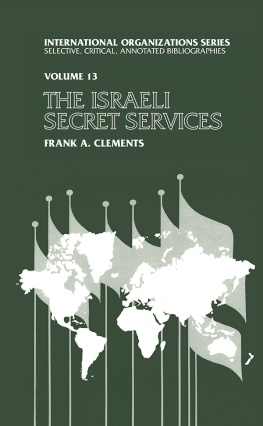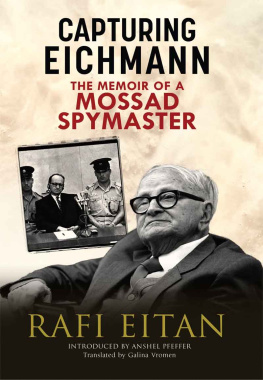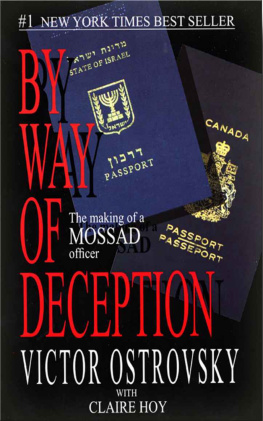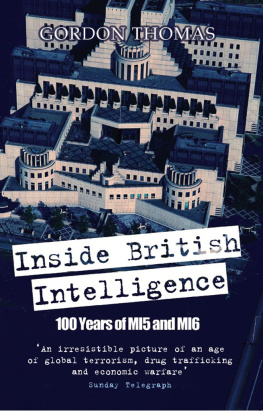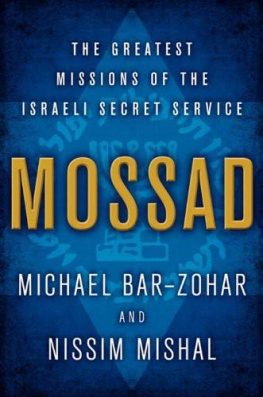BEYOND THE LOOKING GLASS
When the red light blinked on the bedside telephone, a sophisticated recording device was automatically activated in the Paris apartment near the Pompidou Center in the lively Fourth Arrondissement. The light had been wired in by an Israeli communications technician who had flown from Tel Aviv to install the recorder, intended to allay any suspicions neighbors would have about the phone ringing at ungodly hours. The technician was one of the yaholomin, a member of a Mossad unit that dealt with secure communications in the safe houses of Israels secret intelligence agency.
The one in Paris was like all the others. It had a bombproof front door and window glass which, like the panes in the White House, could deflect scanners. There were scores of such apartments in all the major cities in the world, either purchased outright or rented on long leases. Many were left unoccupied for lengthy periods, ready for the time they would be needed for an operation.
One had been conducted from the Paris apartment since June 1997, when Monsieur Maurice had arrived. He spoke fluent French with a slight Central-European accent. Over the years his neighbors had encountered others like him: men, and occasionally women, who arrived without warning, spent weeks or months among them, then one day were gone. Like his predecessors, Maurice had politely discouraged interest in himself or his work.
Maurice was a katsa, a Mossad field agent.
Physically he was nondescript; it had been said that even on an empty street he would pass virtually unnoticed. He had been recruited in what was still a halcyon time for Mossad, when its legend remained largely intact. His potential was spotted during Israels compulsory military service, when, after boot camp, he had been drafted into air force intelligence. An aptitude for languages (he knew French, English, and German) had been noted, along with other qualities: he was good at filling gaps in a case study and drawing fact out of speculation, and he knew the limits of informed conjecture. Above all, he was a natural manipulator of people: he could persuade, cajole, and, if all else failed, threaten.
Since graduating from the Mossad training school in 1982, he had worked in Europe, South Africa, and the Far East. At various times he had done so under the guise of a businessman, a travel writer, and a salesman. He had used a number of names and biographies drawn from the library of aliases maintained by Mossad. Now he was Maurice, once more a businessman.
During his various postings he had heard of the purges back in the Institute, the name its staff used for Mossad: corrosive rumors of disgraced and ruined careers, of changes at the top, and each incoming Mossad director with his own priorities. None of them had stemmed the loss of morale within the service.
This had increased with the appointment of Benyamin Netanyahu as Israels youngest prime minister. A man with a proven intelligence background, he was supposed to know how things worked on the inside ; when to listen, how far to go. Instead, from the outset, Netanyahu had astonished seasoned intelligence officers by dabbling in operational details.
At first this was put down to unnecessary zeal, a new broom showing he was ready to look into every closet to make sure there were no secrets he should know. But matters had become alarming when not only the prime minister but his wife, Sara, wanted to peer behind the looking glass into Israels intelligence world. She had invited senior Mossad officers to call on her at home and answer her questions, claiming she was following the example of Hillary Clintons interest in the CIA.
The featureless corridors of Mossads headquarters building in Tel Aviv had echoed with the scandalized whispers of how Sara Netanyahu had demanded to see psychological profiles of world leaders she and her husband would be entertaining or visiting. She had especially asked for details about President Bill Clintons sexual activities. She had also asked to review dossiers on Israels ambassadors whose embassies they would be staying in during overseas trips, expressing an interest in the cleanliness of their kitchens and how many times the bedding was changed in the guest suites.
Bemused by her requests, Mossad officers had explained to the prime ministers wife that obtaining such information was not in their intelligence-gathering remit.
Some of the veterans had been removed from the mainstream of intelligence and given responsibility for small operations that required little more than creating paperwork which went virtually unread. Realizing their careers were stagnating, they had resigned, and were now scattered across the length of Israel, keeping themselves occupied with reading, mostly history, trying to come to terms with the fact that they were also yesterdays people.
All this had made Maurice glad to be out of Tel Aviv and back in the field.
The operation that had brought him to Paris had provided another chance to show he was a methodical and careful agent, one able to deliver what was expected. In this case the task was relatively simple: there was no real physical danger, only the risk of embarrassment should the French authorities discover what he was doing and quietly deport him. The Israeli ambassador knew Maurice was in Paris but had not been told why. That was standard operational procedure: if things went wrong, the envoy could plead ignorance.
Maurices task was to recruit an informer. This was known in the esoteric language of Mossad as a cold approach, suborning a foreign national. After two months of patient work, Maurice believed he was now close to succeeding.
His target was Henri Paul, assistant chief of the citys Ritz Hotel, who also acted as chauffeur to its celebrity guests.
One had been Jonathan Aitken, a minister in Britains last Conservative government. Aitken had held special responsibility for coordinating arms sales and had built up a raft of contacts with Middle Eastern weapons dealers. This had led to World in Action, a TV investigative program, and the Guardian newspaper publishing highly damaging reports about Aitkens ties to men not normally found in the company of government ministers. Aitken had sued for libel. The case had come to hinge on who had paid Aitkens hotel account when he had stayed at the Ritz to meet some of his Arab contacts. In court, Aitken had sworn on oath that his wife had settled the account.

